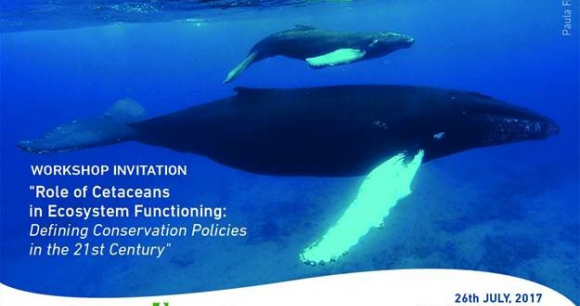
Cartagena, Colombia—A workshop held today at this week’s International Congress of the Society for Conservation Biology (ICCB 2017) revealed that the ecological services that cetaceans (whales and dolphins) provide to the planet may be the key to saving it.
“The Role of Cetaceans in Ecosystem Functioning: Defining Conservation Policies in the 21st Century” explored the growing body of scientific evidence demonstrating that cetacean feces enhance marine productivity by fertilizing ocean waters, which, in turn, sequesters large amounts of carbon from the atmosphere. In addition, the workshop discussed how cetacean carcasses contribute to biodiversity and carbon sequestration on the ocean floor.
The workshop included presentations on the various ecosystem services provided by cetaceans and examined methods on how to economically quantify those services. Presenters and attendees also discussed how to integrate this value within decision-making, not only in regard to whale management, but within global conservation efforts generally, including ocean health and climate change policy.
“I’m thrilled to see that the ecological role of great whales is finally getting attention from policy-makers and conservationists,” said presenter Dr. Joe Roman of the University of Vermont, who leads research on the ecosystem services of whales. “We’ve long known the value of whales on the flensing deck, but this symposium allows us to think about the enormous value of cetaceans in the oceans. This work is essential as we see many species recover after centuries of relentless harvest.”
“A strong case can be made that policies protecting whales--to allow their diminished populations to return to pre-exploitation levels--makes ecological and economic sense,” said Sue Fisher of the Animal Welfare Institute, one of the workshop presenters. “This is not just an issue for the International Whaling Commission, which is considering a return to commercial whaling. The huge contribution made by whales to climate stabilization and ocean productivity is relevant to climate change policy, fisheries management and sustainable development goals. We are looking at how policy-makers can factor the role and value of cetaceans to ecosystem functioning into their decision-making for our ailing planet.”
Said Barbara Galletti, president of Centro de Conservacion Cetacea, “After the IWC resolution on cetacean and ecosystem functioning was approved in 2016, this workshop has provided important information and was the next critical step to facilitate the implementation of this resolution as well as advance the consideration of cetaceans’ contributions to ecosystem functioning in other international agreements.”
The organizers of the workshop, the Animal Welfare Institute (USA), Centro de Conservación Cetacea (Chile) and Instituto de Conservación de Ballenas (Argentina), plan to publish a report on the event’s findings. Additional support and/or funding for the workshop was provided by the Government of Chile, Cetacean Society International, Humane Society International, the Natural Resources Defense Council, OceanCare, and Whale and Dolphin Conservation.
Sue Fisher, Animal Welfare Institute, (503) 484-8002, [email protected]